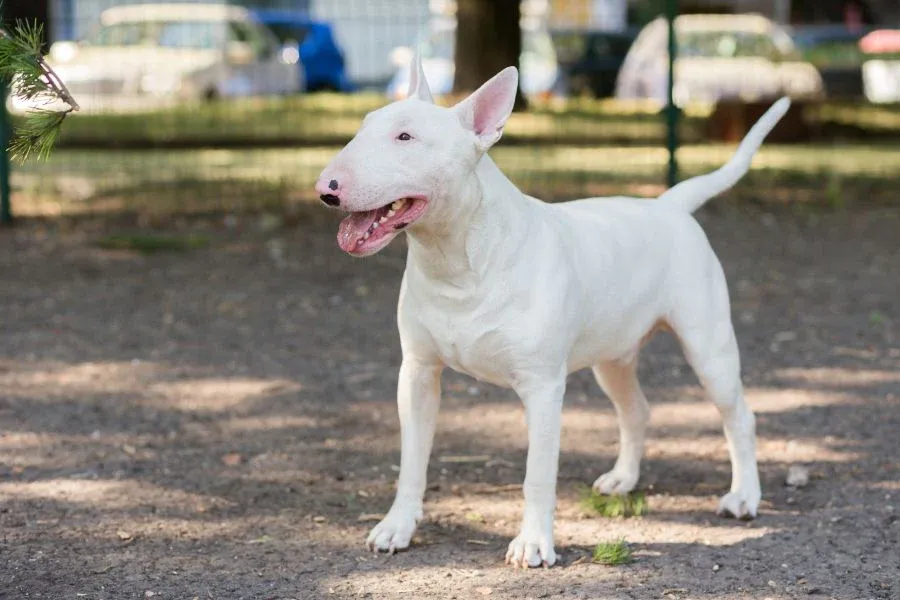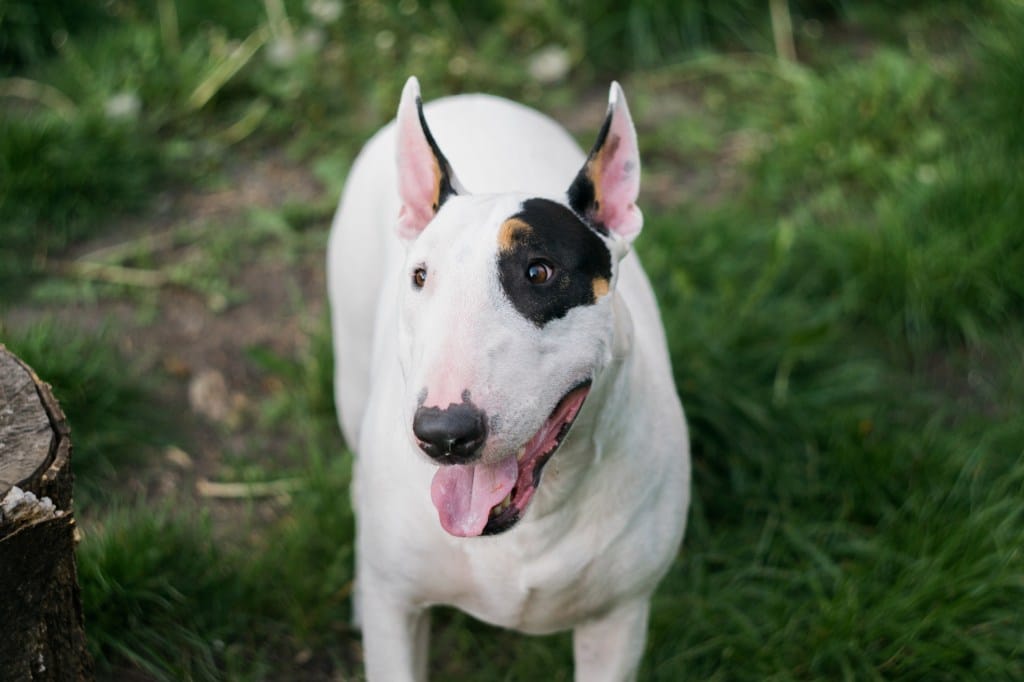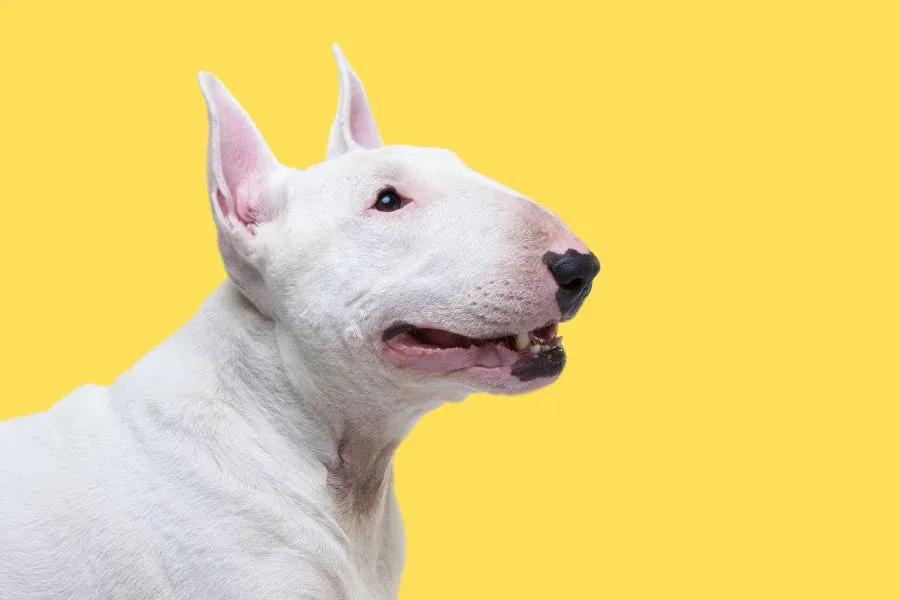Bull Terriers are a unique breed of dogs that are known for their muscular build and egg-shaped head. They are often recognized for their distinctive appearance and are popular pets for many families. However, before deciding to bring a Bull Terrier into your home, it is important to consider their shedding habits and whether they are suitable for people with allergies.

One of the most common questions potential Bull Terrier owners ask is whether they shed a lot. The answer is yes, Bull Terriers do shed, but the amount of shedding varies from dog to dog. Some Bull Terriers may shed more than others, depending on their coat type and genetics. It is important to note that all dogs shed to some extent, and Bull Terriers are no exception. However, their short, fine coat makes them easier to groom and maintain compared to other breeds with longer, thicker coats.
Bull Terrier Basics
Breed Overview
Bull Terriers are a breed of dog known for their unique egg-shaped head and muscular build. They were originally bred in England in the 19th century for bull-baiting and later as a companion animal. Today, they are popular pets and are known for their playful and energetic personalities.
Bull Terriers are considered a type of terrier, and they are known for their tenacity and courage. They are also highly intelligent and trainable, making them a good choice for experienced dog owners.

Coat Characteristics
Bull Terriers have a short, smooth coat that is easy to maintain. They come in a variety of colors, including white, black, brindle, and fawn. While they are not heavy shedders, they do shed moderately throughout the year.
Regular grooming can help to minimize shedding and keep a Bull Terrier's coat looking healthy and shiny. Brushing their coat once or twice a week with a slicker brush or rubber curry brush can help to remove loose hair and distribute natural oils throughout their coat.
Overall, Bull Terriers are a unique and lovable breed with a short, smooth coat that is easy to maintain. While they do shed moderately, regular grooming can help to keep shedding under control and maintain their coat's health and appearance.
Understanding Shedding
Bull Terriers are known for their short, shiny coat that requires minimal grooming. However, shedding is a natural process that occurs in all dogs, including Bull Terriers. Understanding shedding patterns and factors that affect shedding can help owners manage their pet's coat.
Shedding Patterns
Bull Terriers have a single-layer coat that sheds minimally throughout the year. However, they do undergo a seasonal shedding process twice a year, during the spring and fall. During these periods, they shed their undercoat to prepare for the upcoming season. Shedding can vary depending on the individual dog's genetics, age, and environment.
Factors Affecting Shedding
Several factors can affect the shedding patterns of Bull Terriers. Hormones play a significant role in shedding, and spaying or neutering can affect the amount of shedding in dogs. A healthy diet and regular exercise can also help reduce shedding. Genetics also play a significant role in shedding, and some dogs may shed more than others due to their genetics.
In conclusion, shedding is a natural process that occurs in all dogs, including Bull Terriers. Understanding the shedding patterns and factors that affect shedding can help owners manage their pet's coat. Regular grooming and a healthy lifestyle can help reduce shedding in Bull Terriers.
Grooming and Maintenance
Regular Brushing
Bull Terriers have a short, smooth coat that is relatively easy to maintain. However, they do shed moderately throughout the year and require regular brushing to remove loose hair and prevent matting. A bristle brush or slicker brush can be used to remove loose hair and distribute natural oils throughout the coat. Brushing should be done at least once a week, but more frequent brushing may be necessary during shedding seasons.
Bathing and Cleaning
Bull Terriers do not require frequent bathing, as their coat naturally repels dirt and water. However, they may need a bath every few months to keep their coat clean and healthy. When bathing a Bull Terrier, it is important to use a mild shampoo specifically formulated for dogs. Harsh shampoos can strip the coat of natural oils and cause skin irritation. After bathing, the coat should be thoroughly rinsed to prevent any shampoo residue from irritating the skin.
In addition to regular brushing and bathing, Bull Terriers also require regular ear cleaning to prevent infections. Ear cleaning should be done once a week using a gentle ear cleaner and cotton balls. It is important to never insert anything into the ear canal, as this can cause injury.
Tools and Techniques
When grooming a Bull Terrier, it is important to use the right tools and techniques to keep their coat healthy and shiny. A bristle brush or slicker brush can be used for regular brushing, while a Furminator can be used to remove loose undercoat during shedding seasons. It is important to never use scissors or clippers to cut the coat, as this can cause injury and uneven growth.
Overall, Bull Terriers are relatively low-maintenance when it comes to grooming and maintenance. With regular brushing, bathing, and ear cleaning, their coat can remain healthy and shiny for years to come.
Health and Nutrition
Dietary Influence
A balanced diet is essential for the overall health of a Bull Terrier. A high-quality dog food that is specifically formulated for their breed and age is highly recommended. It is important to ensure that the food contains all the necessary nutrients, including fatty acids and vitamins.
Fatty acids, such as Omega-3, are essential for maintaining a healthy coat and skin. They also help reduce inflammation and improve joint health. Therefore, it is recommended to choose a dog food that contains a good amount of Omega-3 fatty acids.
Bull Terriers are prone to allergies, so it is important to avoid feeding them food that contains common allergens such as wheat, corn, and soy. Instead, opt for dog food that contains high-quality protein sources such as chicken, lamb, and fish.

Supplements and Vitamins
In addition to a balanced diet, supplements and vitamins can also be beneficial for a Bull Terrier's overall health. However, it is important to consult with a veterinarian before giving any supplements or vitamins to your dog.
Some supplements that may be beneficial for Bull Terriers include glucosamine and chondroitin, which help improve joint health, and probiotics, which can improve digestion and boost the immune system.
Vitamins such as Vitamin E and Vitamin C can also be beneficial for maintaining a healthy coat and skin. However, it is important to ensure that the dog is not receiving an excessive amount of vitamins, as this can be harmful to their health.
Overall, a balanced diet that contains all the necessary nutrients, including fatty acids and vitamins, is essential for maintaining the health of a Bull Terrier. Supplements and vitamins can also be beneficial, but it is important to consult with a veterinarian before giving any to your dog.
Managing Shedding
Bull Terriers are known for their short, sleek coat, which requires minimal grooming. However, like all dogs, they do shed. Shedding is a natural process that occurs as old hair falls out and new hair grows in. While shedding is normal, excessive shedding can be a sign of an underlying health issue. In this section, we will discuss how to manage shedding in Bull Terriers.
Environmental Factors
Environmental factors can play a significant role in shedding. Temperature and weather can affect the amount of fur a dog sheds. During the summer months, Bull Terriers may shed more as they try to regulate their body temperature. Similarly, during the winter months, they may shed less as they retain more of their coat to stay warm.
Allergens can also contribute to shedding. Dogs can be allergic to a variety of things, including pollen, dust mites, and certain foods. If your Bull Terrier is shedding excessively, it may be worth considering whether they have an allergic reaction to something in their environment.
Reducing Excessive Shedding
There are several steps you can take to reduce excessive shedding in your Bull Terrier. First, make sure they are on a healthy diet. A diet that is high in protein and low in fillers can help keep their coat healthy and reduce shedding.
Regular grooming can also help manage shedding. Brushing your Bull Terrier's coat regularly can help remove loose fur and prevent it from ending up all over your house. Additionally, bathing your Bull Terrier can help remove loose fur and keep their coat healthy.
Finally, if you notice your Bull Terrier is shedding excessively, it may be worth taking them to the vet. Excessive shedding can be a sign of a skin condition or other health issue, and a vet can help diagnose and treat any underlying problems.
In conclusion, shedding is a natural process that occurs in all dogs, including Bull Terriers. However, excessive shedding can be a sign of an underlying health issue. By managing environmental factors and taking steps to reduce excessive shedding, you can help keep your Bull Terrier healthy and comfortable.
Lifestyle and Behavior
Exercise and Play
Bull Terriers are known for their high energy levels and require a moderate amount of exercise and playtime to maintain their physical and mental well-being. They enjoy outdoor activities such as running, playing fetch, and going for walks. Indoor playtime with toys can also be a great way to keep them entertained and stimulated.
Dog owners should be aware that Bull Terriers have a tendency to become bored easily, which can lead to destructive behavior. Therefore, it is important to provide them with plenty of attention and playtime to prevent this from happening.
Stress and Rest
Bull Terriers are generally playful and affectionate dogs that thrive on love and attention. However, they can become stressed if left alone for extended periods of time or if they do not receive enough attention from their owners.
To prevent stress, it is recommended to provide them with plenty of companionship and interaction. They also require a comfortable and cozy place to rest, which can be achieved through the use of a comfortable dog bed or crate.
In summary, Bull Terriers enjoy an active lifestyle that includes plenty of exercise and playtime. They also require love, attention, and companionship to maintain their mental well-being. Providing them with a comfortable place to rest and preventing boredom is crucial to prevent destructive behavior.
Living with a Bull Terrier
Bull Terriers are known for their unique appearance and playful personalities. However, before bringing one home, it's important to consider the shedding habits of this breed. Here are some tips for living with a Bull Terrier and managing their shedding:
Allergies and Pet Owners
Bull Terriers are not considered a hypoallergenic breed, meaning that they can trigger allergic reactions in some people. If you or someone in your household has allergies, it's important to spend time with a Bull Terrier before bringing one home to see if any allergic reactions occur. Additionally, regular grooming and cleaning can help reduce the amount of pet dander in the home.
Home Cleaning Tips
To manage the shedding of a Bull Terrier, regular cleaning is essential. Here are some tips for keeping your home clean:
- Vacuum frequently: Use a vacuum with a HEPA filter to remove pet hair and dander from floors and furniture. Be sure to vacuum under furniture and in hard-to-reach areas where pet hair can accumulate.
- Use a lint roller: Keep a lint roller handy to quickly remove pet hair from clothing and upholstery.
- Groom regularly: Brush your Bull Terrier regularly to remove loose hair and prevent it from ending up all over your home. Use a high-quality brush designed for short-haired breeds.
- Wash bedding: Wash your Bull Terrier's bedding regularly to remove pet hair and dander.
- Use air purifiers: Consider using an air purifier with a HEPA filter to remove pet dander and other allergens from the air.
By following these tips, it's possible to live comfortably with a Bull Terrier and manage their shedding. With regular cleaning and grooming, you can enjoy all the love and playfulness that this breed has to offer.
Bull Terrier Life Stages

Puppy to Adult Coat
Bull Terrier puppies have a soft and fluffy coat that is easy to maintain. As they grow, their coat changes to a short and dense adult coat. The adult coat is easy to care for, but it sheds moderately throughout the year. However, during seasonal changes, the shedding may increase, and the owner may need to brush the dog more frequently to keep the shedding under control.
It is essential to start grooming the puppy from an early age to get it used to the process. Regular brushing will help remove dead hair, distribute natural oils, and keep the coat healthy. It is also important to bathe the puppy occasionally to keep the coat clean and fresh.
Senior Dogs and Shedding
As Bull Terriers age, they may experience changes in their coat and shedding patterns. Some senior dogs may develop a thinner coat, while others may experience increased shedding. This shedding may be due to hormonal changes, allergies, or other health issues.
Senior dogs require more attention and care to maintain their coat. Regular grooming and brushing will help remove dead hair and prevent matting. It is also important to provide senior dogs with a healthy diet and supplements to support their overall health and coat condition.
In conclusion, Bull Terriers have a moderate shedding coat that requires regular grooming and care. By starting grooming from an early age and providing proper care as the dog ages, owners can keep their Bull Terrier's coat healthy and shiny.
Breed-Specific Concerns
Bull Terriers are known for their unique appearance and friendly personalities. However, potential owners should be aware of some breed-specific concerns before bringing one into their home.
Common Health Problems
Like all breeds, Bull Terriers are prone to certain health issues. One of the most common concerns is skin allergies, which can result in excessive scratching and hair loss. Additionally, Bull Terriers may be prone to heart and kidney problems, as well as deafness.
To prevent these health issues, it is important to maintain a healthy diet and exercise routine for your Bull Terrier. Regular visits to the vet are also recommended to catch any potential health issues early on.
Genetic Predispositions
Bull Terriers are a breed with a few genetic predispositions that potential owners should be aware of. One such predisposition is a tendency towards compulsive behaviors such as tail chasing or excessive licking. These behaviors can be managed with proper training and exercise.
Another genetic predisposition in Bull Terriers is a higher risk for certain types of cancer. It is important to keep an eye out for any unusual lumps or bumps and to bring your Bull Terrier to the vet for regular check-ups.
Overall, Bull Terriers are a loyal and protective breed that can make great companions for the right owner. However, it is important to be aware of their potential health concerns and genetic predispositions before bringing one into your home.

Conclusion
In conclusion, Bull Terriers do shed, but their shedding is generally minimal compared to some other breeds. Understanding their coat characteristics and implementing proper grooming practices are essential for managing shedding effectively. With regular care and attention to their overall health, Bull Terrier owners can enjoy the company of their furry friends without being overly concerned about excessive shedding.
FAQs
- Q: How often should I brush my Bull Terrier to manage shedding?
- A: Aim to brush your Bull Terrier at least once a week to minimize shedding and keep their coat in good condition.
- Q: Do Bull Terriers shed more during certain seasons?
- A: Some Bull Terriers may experience slightly increased shedding during seasonal changes, particularly in the spring and fall.
- Q: Can a Bull Terrier's diet impact shedding?
- A: Yes, providing a balanced and nutritious diet contributes to a healthy coat and may reduce excessive shedding.
- Q: Are there any specific grooming products recommended for Bull Terriers?
- A: Use dog-friendly shampoos and conditioners suitable for Bull Terriers to maintain proper hygiene and reduce shedding.
- Q: When should I be concerned about excessive shedding in my Bull Terrier?
- A: If you notice a sudden increase in shedding or changes in coat condition, it's advisable to consult with a veterinarian to rule out underlying health issues.




